The World Cup final fulfilled its role as creator of memories and pinnacle of careers, but true glory is in the journey
Because this game, this spectacle, was not solely about the football nor the footballers

Your support helps us to tell the story
From reproductive rights to climate change to Big Tech, The Independent is on the ground when the story is developing. Whether it's investigating the financials of Elon Musk's pro-Trump PAC or producing our latest documentary, 'The A Word', which shines a light on the American women fighting for reproductive rights, we know how important it is to parse out the facts from the messaging.
At such a critical moment in US history, we need reporters on the ground. Your donation allows us to keep sending journalists to speak to both sides of the story.
The Independent is trusted by Americans across the entire political spectrum. And unlike many other quality news outlets, we choose not to lock Americans out of our reporting and analysis with paywalls. We believe quality journalism should be available to everyone, paid for by those who can afford it.
Your support makes all the difference.At 6pm Moscow time on Sunday 15 July 2018, an Argentinian called Nestor Pitana blew on a black Fox 40 whistle to begin the 21st Fifa World Cup final. A tall, imposing man with an arrestingly angular head and what little was left of his hair spread thinly over his scalp like margarine, the former PE teacher from the village of Corpus Christi on the border with Paraguay was a safe but easy choice for the final. He had overseen the opening game between Russia and Saudi Arabia, handled the quarter-final between France and Uruguay with great poise, earning plaudits for his mixture of firmness and common sense. “Pitana is a rock,” said Pierluigi Collina, the chairman of FIFA’s referees committee, at the start of the tournament.
The decisiveness that earned Pitana the biggest gig of his life was not always evident in his early choices of career. He was a relatively late admission to the refereeing fraternity, having spent most of his 20s moving through a succession of seemingly random professions. He had been an amateur basketball player at regional level, a security guard at a disco, a lifeguard in Buenos Aires and a bit-part actor whose best-known role was as a prison guard in the 1997 action film La Furia. But for the last 11 years, he had been a referee of distinction in the famously fiery Argentinian leagues, taken charge of Superclasicos and Copa America games, booked thousands of irate players, endured thousands more abusive chants from irate fans. Now, his career had received the ultimate fulfilment. “We’ve managed one of the greatest achievements in the world of refereeing,” he said. “And now we want to finish the job.”
You didn’t have to be on the pitch at the Luzhniki Stadium on Sunday night to find yourself at the culmination of a long and saturated journey. For the dancers at the closing ceremony, it was the product of months of training and rehearsals in unseen gymnasiums. For one particular journalist in row 11 of the press box, it was the strangely poignant consummation of a dream that had first been birthed in a nondescript suburban house in west London, watching Roberto Baggio’s penalty sail over the crossbar in Pasadena and being struck above all by the light, the noise, the way heat can somehow transmit itself through a television screen, the way adults behave when something of grave and physical importance is taking place.
And for thousands of Croatians, it was the end of the journey in a much more literal sense. They had flown and driven all the way from the Adriatic coast, they had begged relatives and friends for money to buy a ticket. Some had flights booked home after the quarters and semi-finals, but had simply not taken them, and now had no idea how to get home. One guy told Reuters he had spent two months’ salary on getting to Russia. “It’s a lot of money,” he explained, “but this is one time in your life.” They mingled with fans from all over the world who didn’t have a team in the final but had simply stayed on for the ride: Brazilians, Mexicans, Argentinians, Peruvians, Germans, Chinese, Indians. They came from every corner of the globe, bonded by nothing except a love of football and a love of the big occasion.
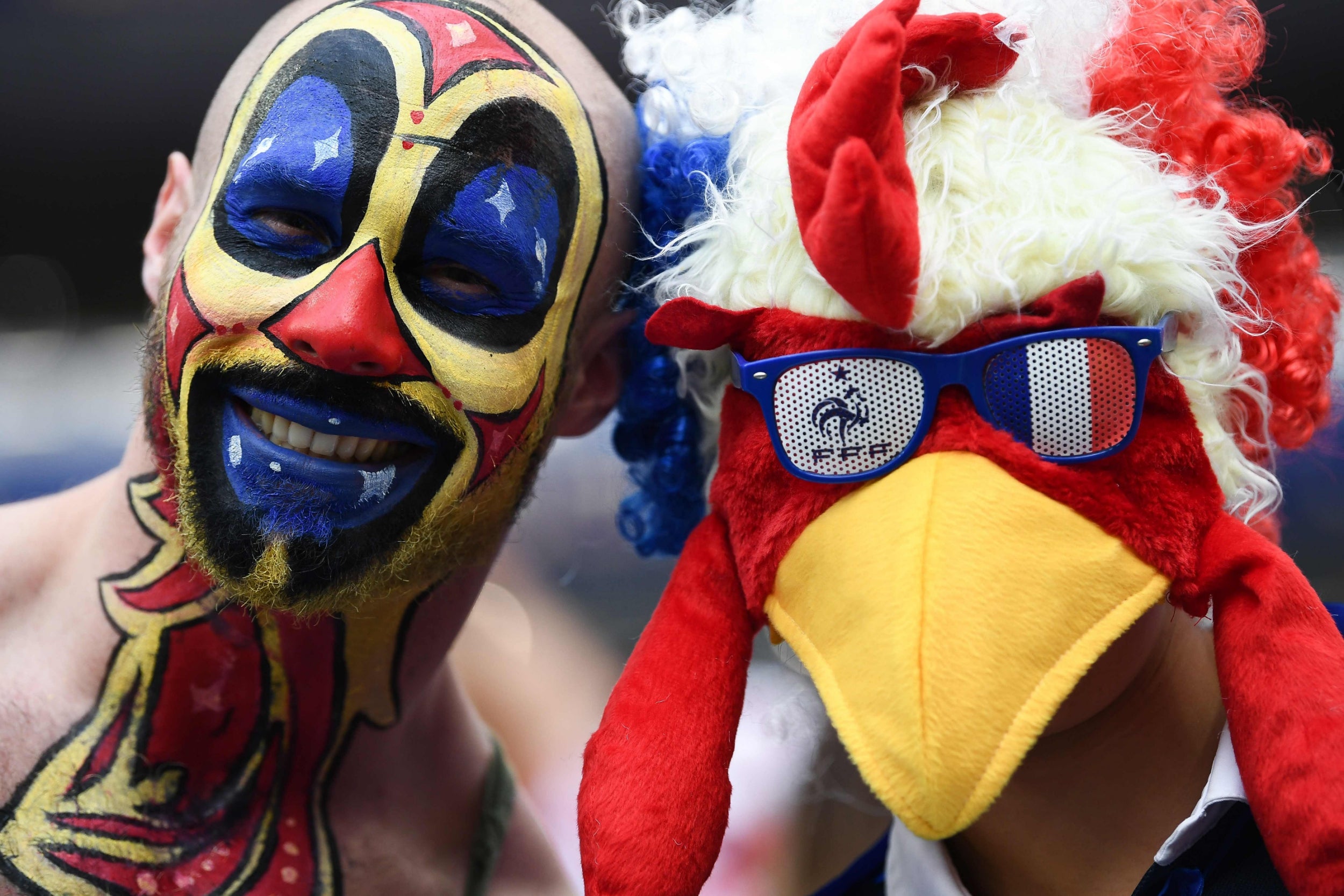
Actually, there was one other thing uniting them all. Tickets for the final started at £340 and went up to £830. Throw in flights and other incidentals, and even if you subsist on crisps and sleep on hostel bunks, there’s no way of getting to a World Cup final unless you’ve got a few thousand pounds up your sleeve - or know someone who has. They filed in past placards and banners advertising Visa and Budweiser and Gazprom, willingly forked out £10 for match programmes and £3 for bottles of water. The World Cup likes to see itself as a celebration of humanity in its entirety, a travelling circus where all can come and be transfixed. In reality, it’s more like a giant spinning wheel, where the closer to the hub you get, the more impossible it is to ignore the stench of money, real and implied.
The Luzhniki Stadium is flanked on most of its north side by a lovely little copse of lime trees. It’s the perfect place to take a little shade before the game, to sit on the cool grass and have a drink or a chat. The trouble is, you can’t brand a tree. You can’t paint it in Fifa-approved colours and festoon it with logos. You can’t erect a merchandising tent next to it. Trees are nature, and when you’ve made your entire tournament a shrine to the man-made, nature is something to be distrusted, built around, cordoned off. And so a line of imposing metal barriers stands around it, just in case people confuse it with somewhere Fifa wants them to walk.
It was in front of these metal barriers that Gianni Infantino’s chauffeur-driven car pulled up a couple of hours before kick-off. The president of Fifa fiddled with the buttons on his jacket as he ascended the red-carpeted steps into the dignitaries’ entrance, waving and smiling at the cameras like the executive producer who thinks he’s the star of the movie. He took his seat next to Vladimir Putin in the stands. For both, this was also the end of the journey: a long and lucrative journey, one that has seen the abuses of the organisations both preside over buried under a tide of smiley emojis and primetime entertainment and pure, liquid football.
Pitana blew his whistle and Mario Mandzukic passed the ball backwards.
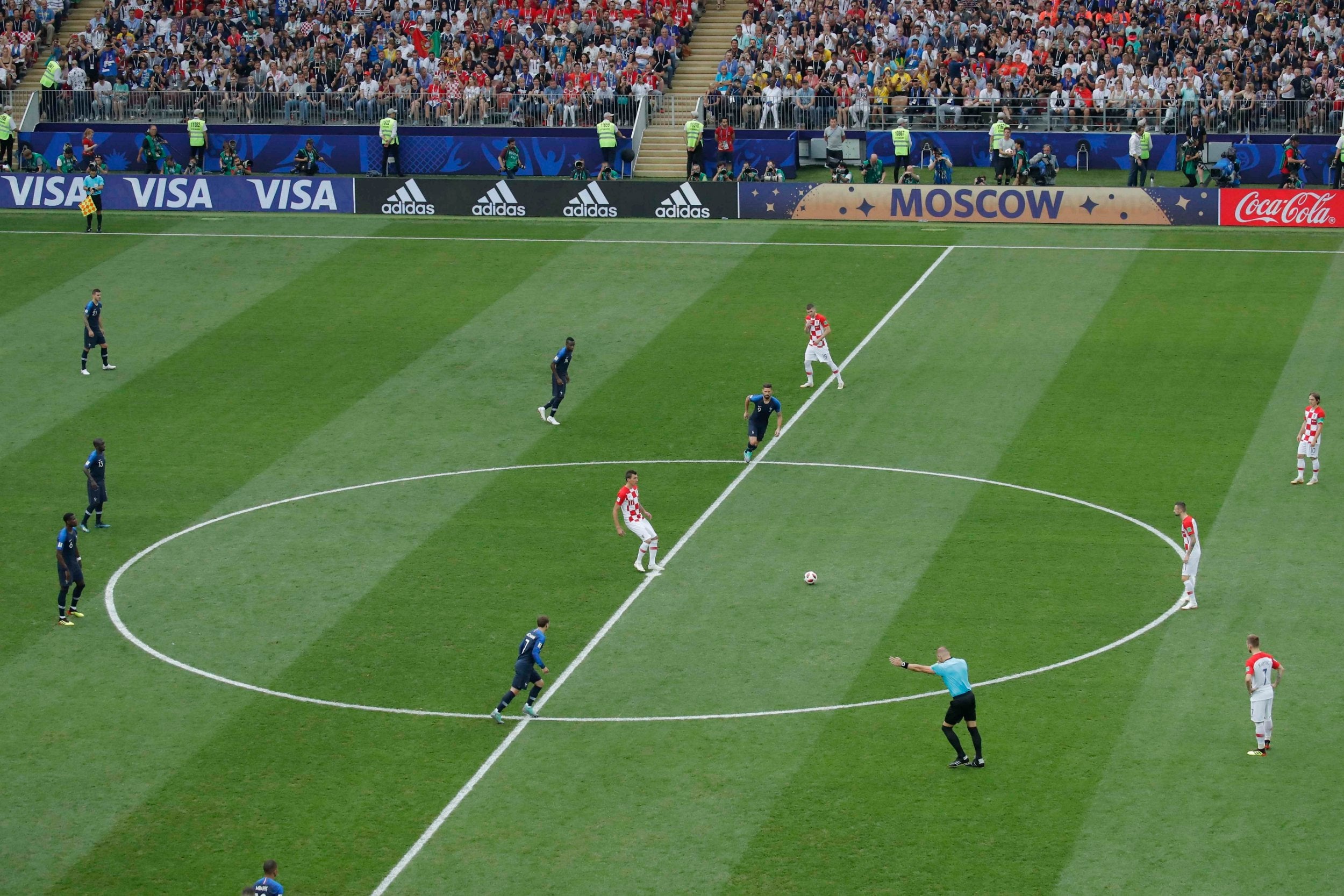
The early stages of any World Cup final are curiously inert, on the stands as on the pitch. You are simply accustoming yourself to the sensation of being at a World Cup final, the sheer rarity and surrealness of what is unfolding before you, taking stock of your emotions. “Treat it like any other game,” players at all levels are told before a big match or a prestigious final. But you just can’t. It’s the World Cup final, and that fact is there in every cubic centimetre of air you gasp into your lungs.
It took France 16 minutes to fashion their first attack. Antoine Griezmann was upended by Marcelo Brozovic. Griezmann himself stepped up to take the free-kick, his greenish-pink boots shimmering like the belly of a trout. It was a good delivery, but in the penalty area Mandzukic - one of the strongest headers of a ball on the pitch - had fixed his eyes on the flight of the ball, was manoeuvring himself into position, and was probably telling himself he had it covered.
Mandzukic was six years-old when he fled the civil war in Yugoslavia in 1992 with his parents and sister. His parents uprooted the family to the town of Ditzingen in Germany, just outside Stuttgart. Speaking no German and adrift in a strange country, Mandzukic would cry uncontrollably when his parents sent him to school, because he could understand nothing and nobody. But he got up to speed quickly, both in the local tongue and the universal language of football. The coaches at TSF Ditzingen quickly realised they had a considerable and curiously driven talent on their hands.
But then, after four years, the Mandzukic family’s residency permit ran out. All attempts to remain in Germany failed, and so they returned to Croatia. Perhaps that decentred, disoriented wandering spirit never quite left him. Mandzukic plays with the sort of restlessness and hunger that you find in a man who expects the rug to be pulled from under his feet at any moment. For a forward, he chases the ball as relentlessly and intelligently as anybody else in his position. And he has spent years and years honing his craft as one of the world’s best aerial duellists, as useful defending a corner as he is winning the ball at the back post and knocking the ball down for a strike partner.
Mandzukic leapt for the ball. Paul Pogba’s hand was on his back, but he was still able to get a firm base. But at the very last second, the ball disappeared.
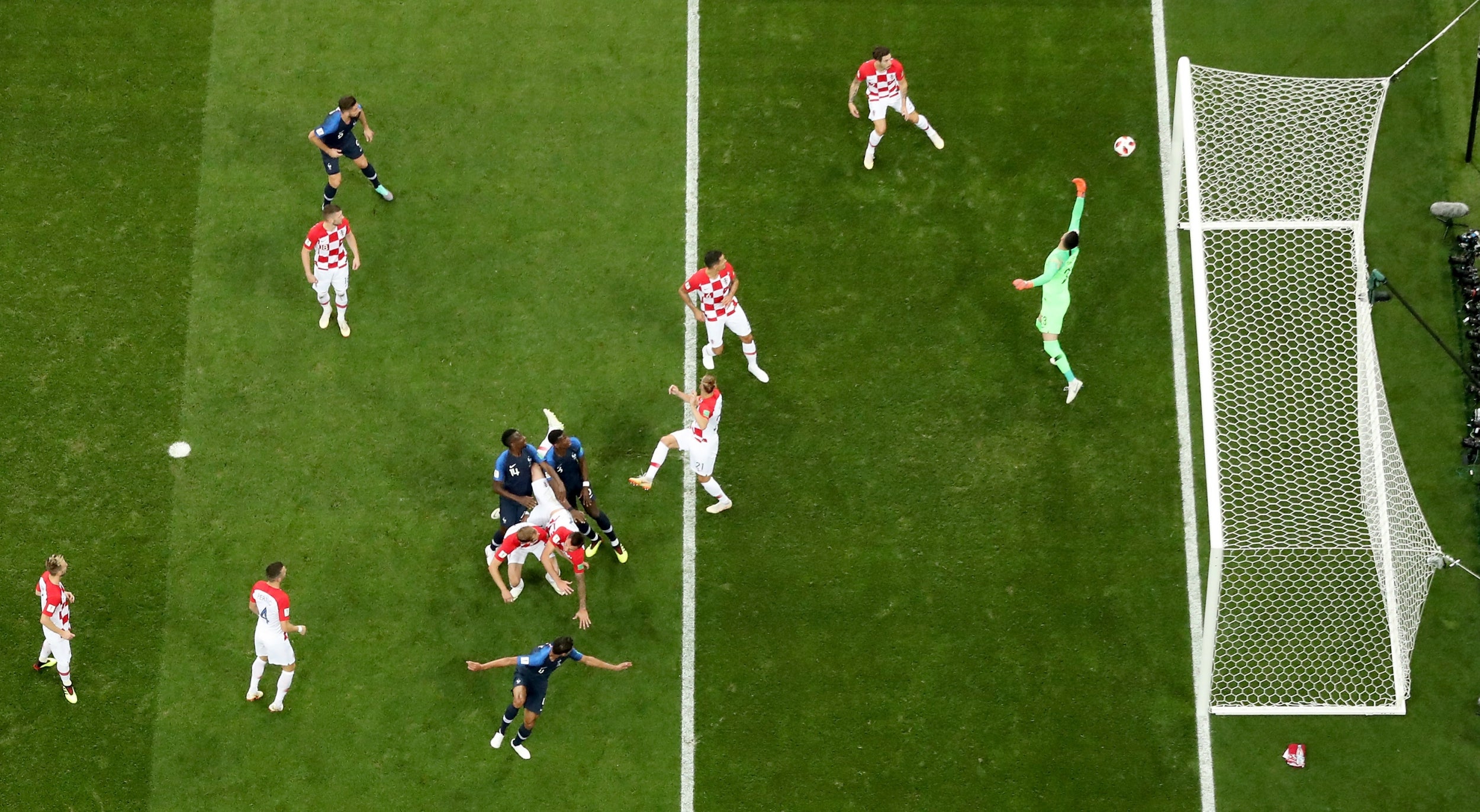
A blur of blue flew in front of his eyeline; the sight of France’s Raphael Varane leaping across him. By the time Varane had passed, the ball was on Mandzukic before he could react. As he frantically tried to readjust, he lost balance. The ball kissed the top of his head and hit the back of the net at around the same time Mandzukic’s body hit the floor. A lifetime spent judging the flight and trajectory of a football, a career spent practising the timing and height of a leap, and all it had taken to undo it was some bloke jumping in front of him. The scorebook won’t record that Mandzukic is one of the primary aerial threats of his generation. It’ll record that he scored an own goal in the World Cup final.
As Croatia kicked off for the second time, the stadium was shaken by a terrific shattering noise.
A colossal shower was beating down on the Luzhniki, rain pouring from an angry-looking grey sky. Ten minutes after going behind, Croatia equalised through Ivan Perisic, Domagoj Vida setting the chance up, Perisic taking a touch before smashing the ball goalwards. It will have felt good off the foot. You always know when you’ve caught one well. Varane, arriving late on the scene again, this time got just enough of the ball to divert it past Hugo Lloris. No spin. Right into the corner. How must it feel to strike a football as sweetly as that in a World Cup final? As the jubilant Croatians mobbed Perisic near the corner flag, Mandzukic was one of the last on the scene, leaping gleefully atop the huddle.
Then came the moment that swung the game. Griezmann swung in another corner; Blaise Matuidi leapt in front of the ball; Perisic couldn’t get his hand out of the way in time. Pitana must have known, as soon as he saw France’s outraged players surrounding him, that this would be the biggest decision of his career. He hadn’t seen any infringement himself, and nor had any of his officials. But then, imagine if he waved away the appeals and it turned out Perisic had slapped it like a volleyball player? With the solemnity of a man who knows the next few minutes would be the biggest of his life, Pitana called for a television review.
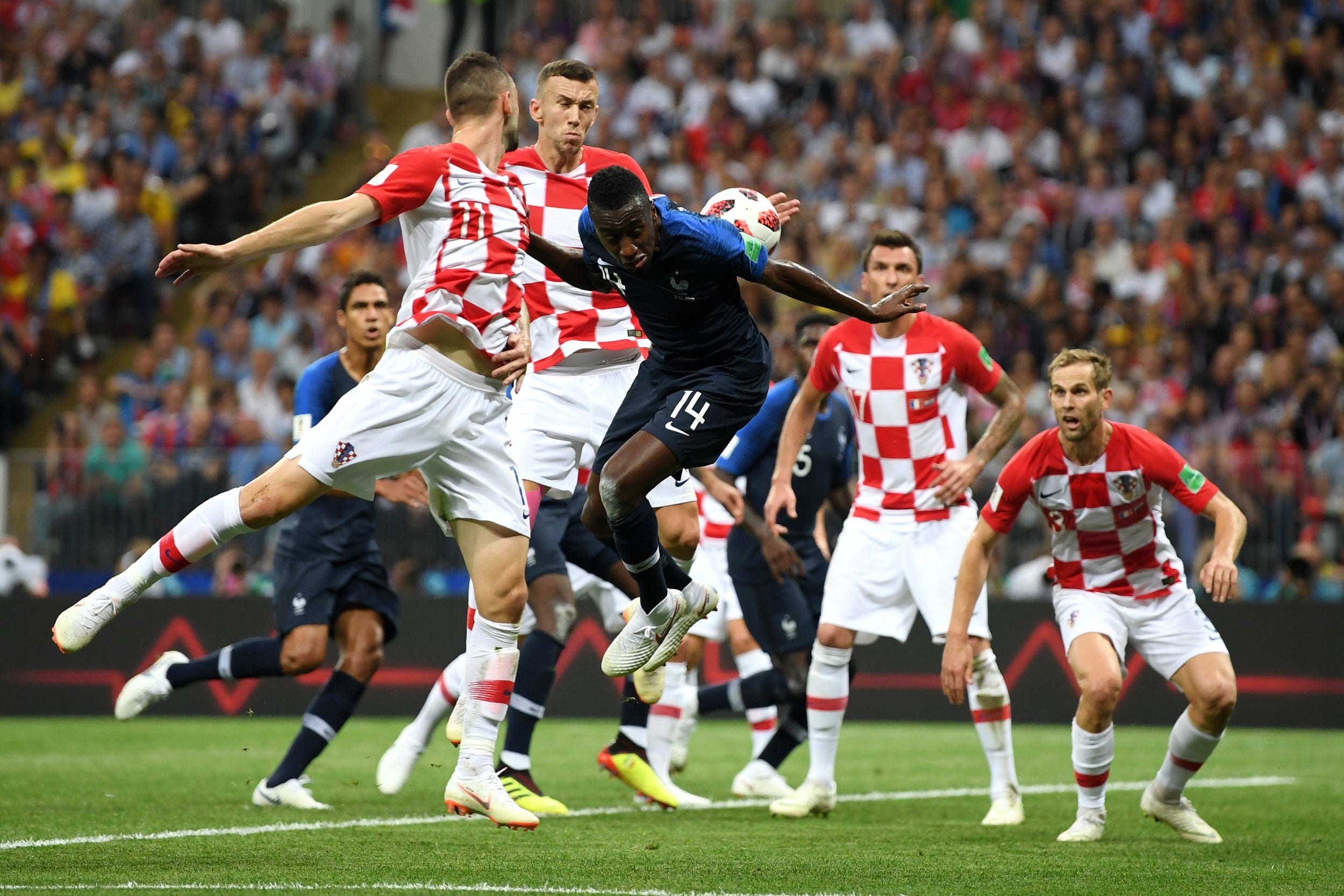
He jogged to the side of the pitch and stared at the replay screen for around a minute and a half, watching replay after replay. Ball hitting hand hitting ball hitting hand. After a while, it became almost mesmerising, like a dance that had been enacted for our benefit alone. What was Pitana thinking in those moments? He can’t have been convinced either way, because as he pulled away to give his decision he changed his mind and went back to the screen for another look. Suddenly, you could imagine all the old indecisions weighing on him again. Is that guy waving or drowning? Was that take OK? Is that customer wearing trainers?
A magnificent clap of thunder greeted Griezmann as he stepped up to take the penalty, which he scored.
Pogba was once asked in an interview why the Paris suburbs produce so much footballing talent. “Because there is only soccer,” he replied. “Every day it's the ball. That's all there is.”
But of course, that isn’t quite the whole story. They play soccer in the shadows of tower blocks and shanty towns all over the world. It’s the world’s game. The reason the banlieues have produced the likes of Pogba, N’Golo Kante, Matuidi and Kylian Mbappe isn’t because Paris is a uniquely fertile footballing flowerbed. It’s because France is uniquely adept at finding talent and nurturing it all the way to fruition.
There isn’t a club in France that doesn’t have scouts exhaustively watching youth games in every part of the city. Once talent is identified, the best of it is filtered through to the national academy at Clairefontaine, where they get a tactical education, play in age-group sides, get a few of the rougher edges smoothed off: a sort of finishing school for elite football.
France is better at doing this than virtually any other country bar a few of its wealthy Western European neighbours. Their World Cup triumph is a victory for many things: the persistence of coach Didier Deschamps, the virtues of team spirit, a collective attitude of improvement and expression. But it’s also, at least in part, a victory for the French system, one that simply isn’t available to countries like Cameroon or Costa Rica or even Croatia.
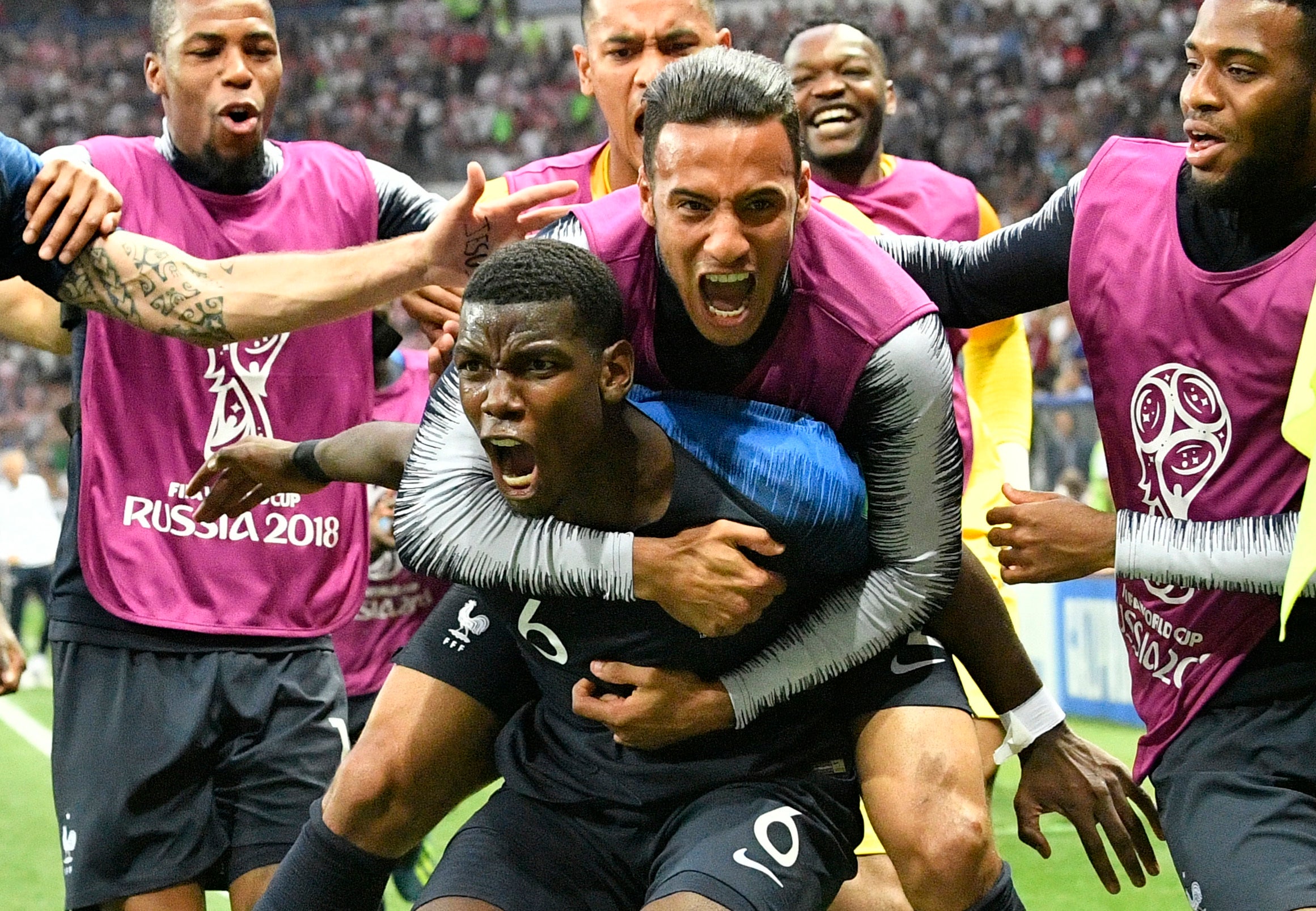
But a functional system can only get you to the game. You still need to play it. And for Pogba, a man who has spent the last few years being maligned for all sorts of reasons only tangentially connected to his footballing ability, his goal - effectively sealing France’s victory - was in many ways a vindication of his own personal journey, from Paris to Manchester to Turin to Manchester to the sodden, victorious turf of Moscow.
His goal was a fine finish that nonetheless enjoyed an element of fortune. His initial shot was charged down, only for the ball to deflect back to him in a superior position. But then, success is never simply about talent, and it’s never simply about luck. It’s always a bit of both. Even so, as Pogba wheeled away in celebration, slapping his chest as if trying to get his heart to beat still faster, he may have had cause to reflect on the old saw that life doesn’t give you second chances. Pogba had just had two in the space of about three seconds.
There was still time for a surreal coda: Mbappe popping a fourth goal in as easily as potting the black in a game of pool, Hugo Lloris making an unforgettable and yet largely inconsequential error to allow Croatia a late consolation. Full-time came with a drenching inevitability; the rain had swollen to torrential by this point, and France’s sodden shirts clung to their backs as they celebrated, their haircuts heavy and dishevelled, their fans soaked but happy. Infantino had finagled his way onto the victory podium, and the last voice Lloris will have heard before lifting the trophy will have been that of the Fifa president.
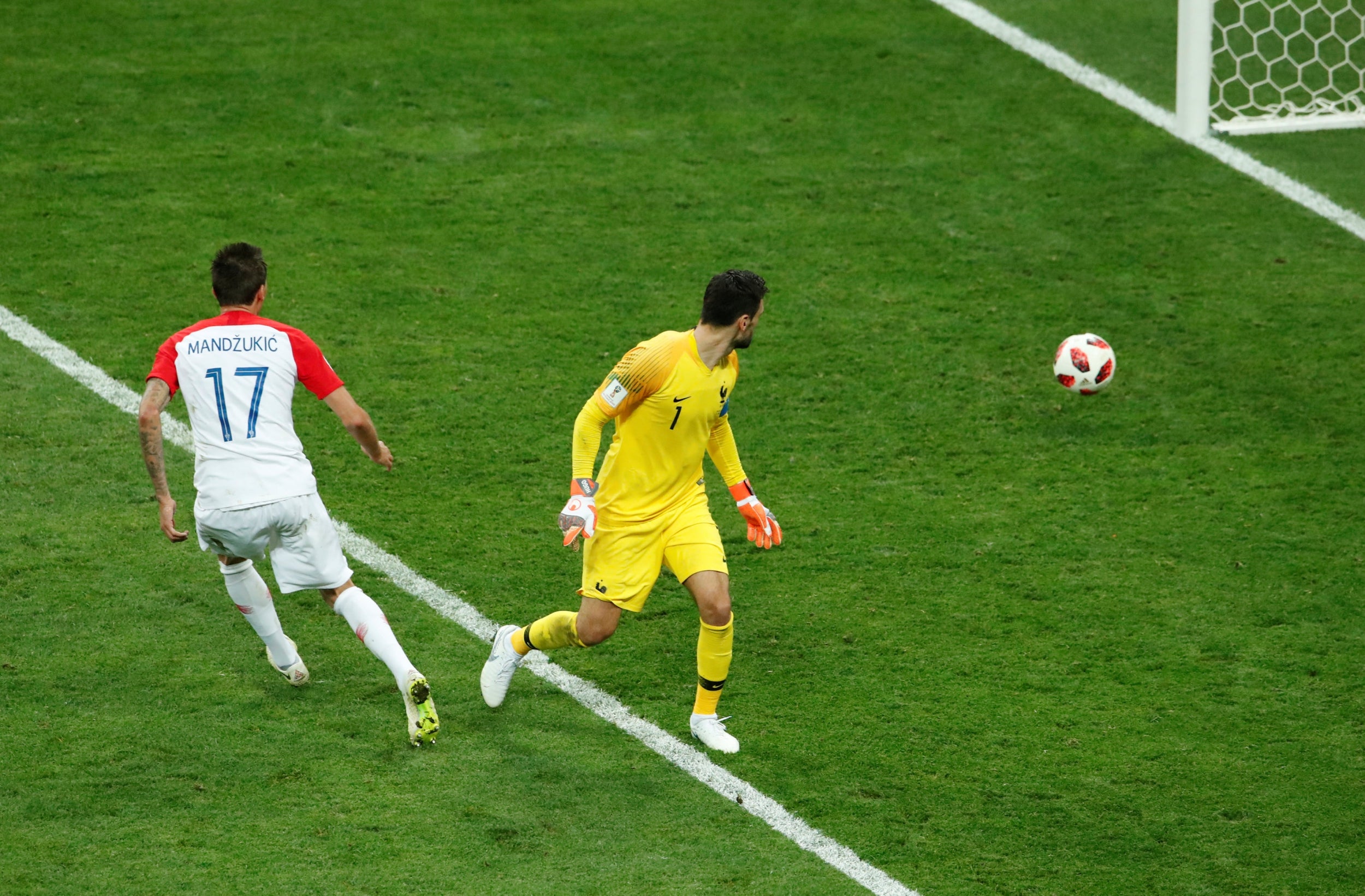
The shiny gold confetti was still littering the pitch an hour after full-time. But the presentation podium was deserted, the VIPs had gone inside to dry off, and having wrung every last drop of value out of their ticket price, the 78,000 fans were finally drifting out of the stadium and back into the city. The last smoke rings of the World Cup were wafting off into the Moscow night, not to resurface until Qatar in four years’ time. It felt like the end of the journey, and in more ways than one.
It was a game that will define careers. Pitana will always be remembered as the man who gave that penalty. Pogba will always be remembered as the man who scored that goal. Croatia will always be remembered as the team who fought their way to the final, played beautifully for an hour, and then realised they had nothing left to give. Will fate offer them a second chance? It’s unlikely.
But even though they lost, in a way nobody gets to a World Cup final without, in some sense, having won. Croatia earned their place in the World Cup final through the sort of sweat and skill that was beyond 207 other teams in the world. They have created memories that will nourish an entire generation. Once the tears have dried and the trauma of Sunday 15 July 2018 feels a little less raw, once they look back at the photos and take solace in loved ones, perhaps they will reflect that ultimately, the glory is all in the journey rather than its ending.
Join our commenting forum
Join thought-provoking conversations, follow other Independent readers and see their replies
Comments